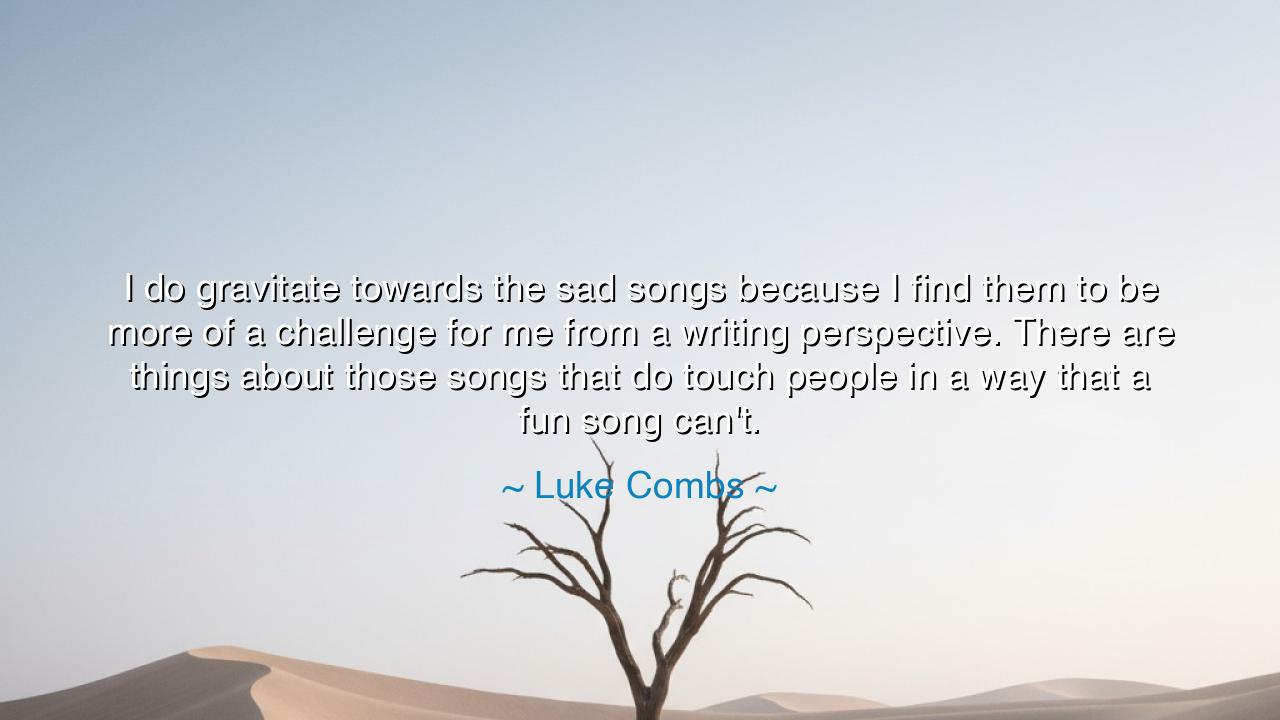
I do gravitate towards the sad songs because I find them to be
I do gravitate towards the sad songs because I find them to be more of a challenge for me from a writing perspective. There are things about those songs that do touch people in a way that a fun song can't.






Hear, O children of melody and seekers of truth in song, the words of Luke Combs, who with plain honesty revealed the path of his craft: “I do gravitate towards the sad songs because I find them to be more of a challenge for me from a writing perspective. There are things about those songs that do touch people in a way that a fun song can't.” These words, though simple in form, carry a deep wisdom about the nature of art, about sorrow as teacher, and about the power of song to pierce the soul more deeply through sadness than through laughter.
The meaning of his confession is this: joy is fleeting, but sorrow endures. To write a fun song is to capture delight for a moment, to paint sunshine that warms the spirit. But to write a sad song is to descend into the caverns of the human heart, to wrestle with loss, regret, longing, and grief. This is why it is a challenge, for such songs demand honesty and vulnerability from the writer. They require the artist to stand naked before the world, offering not just melody but memory, not just rhyme but truth.
History itself testifies to the enduring power of sorrow in art. Consider the great composer Beethoven, who, though deaf and tormented, poured his anguish into symphonies that thunder with both despair and triumph. His works touch the human soul not because they are light and easy, but because they are heavy with struggle. Or think of the Negro spirituals sung by enslaved people in America—songs of sorrow, yearning, and hope. They endure because their sadness carries truth, and truth always moves more deeply than fleeting joy.
Luke Combs, in gravitating toward such songs, embraces this ancient wisdom: that sadness in song becomes a balm. It connects strangers, heals wounds, and reminds the listener they are not alone. Where a fun song may make the body dance, a sad song makes the soul remember. It is this depth, this piercing of the heart, that he calls a greater challenge—and a greater gift.
The lesson we take from his words is that we must not flee from sadness. In our lives, as in music, sorrow has its place. To deny it is to deny part of what makes us human. To embrace it—to put it into words, or into song, or into story—is to transform it, to give it meaning, and to share that meaning with others. As Combs reminds us, sad songs touch us in a way joy cannot: they are the proof of our endurance, the testimony of our shared humanity.
The warning is also clear: do not live only for the lightness of fun, for it cannot sustain you when the shadows come. The one who ignores sorrow is unprepared when it arrives. But the one who has faced it, sung it, written it, or listened to it deeply, finds in it not only grief but strength. Sadness, when expressed truthfully, does not destroy—it refines.
As for practical action, let each person learn to express their own sorrow honestly. Do not bury it in silence, nor mask it with endless noise. Write it, sing it, speak it, share it. And when you encounter the sad songs of others, do not turn away, but let them work upon you. Allow them to deepen your empathy, to connect you to the vast fellowship of souls who have known pain. In this way, sadness becomes not isolation but communion, not despair but understanding.
Thus, Luke Combs’s words stand as both testimony and teaching: sad songs are a challenge, but they touch us in a way joy cannot. Let us then honor the power of sorrow, not as an enemy of happiness, but as its teacher. For he who can write, hear, or embrace the sad song has found the key to the deepest chambers of the human heart—and in those chambers lies the strength to endure, and the wisdom to live fully.






AAdministratorAdministrator
Welcome, honored guests. Please leave a comment, we will respond soon